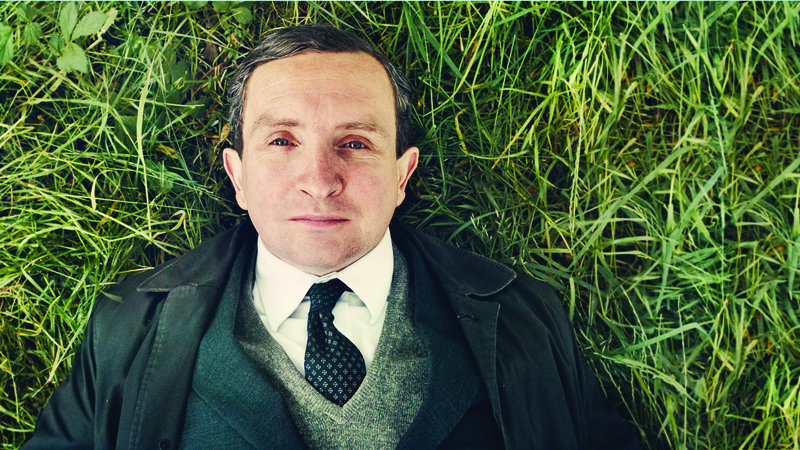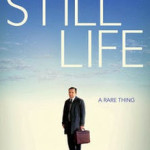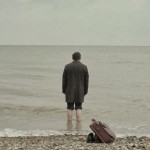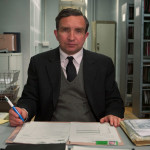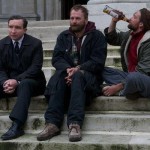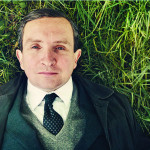Eleanor Rigby, picks up the rice
In the church where a wedding has been
Lives in a dream
Waits at the window, wearing the face
That she keeps in a jar by the door
Who is it forAll the lonely people
Where do they all come from?
All the lonely people
Where do they all belong?Father McKenzie, writing the words
Of a sermon that no one will hear
No one comes near
Look at him working, darning his socks
In the night when there’s nobody there
What does he careAll the lonely people
Where do they all come from?
All the lonely people
Where do they all belong?Ah look at all the lonely people
Ah look at all the lonely peopleEleanor Rigby, died in the church
And was buried along with her name
Nobody came
Father McKenzie, wiping the dirt
From his hands as he walks from the grave
No one was savedAll the lonely people
Where do they all come from?
All the lonely people
Where do they all belong?
So sang the Beatles. Perhaps now there is a movie to articulate those sentiments, of which more anon. It could easily have been the title tune for this movie.
I like Eddie Marsan. He is not only a fine character actor but also an everyman. He doesn’t play superheroes but ordinary people living their lives and dealing with dilemmas. He is also quietly prolific, having appeared in a wide array of TV and movie roles. From Wikipedia:
Marsan’s first television appearance was in 1992, as a “yob“, in the London Weekend Television series The Piglet Files. One of his more significant earliest television appearances was in the popular mid-1990s BBC sitcom Game On as a bungling bank robber. Marsan went on to have roles in Casualty, The Bill, Grass, Kavanagh QC, Grange Hill, Silent Witness, Ultimate Force, Southcliffe, and more. He also voiced the Manticore in the Merlin episode Love in the Time of Dragons. In 2012 he played Dr Ludwig Guttmann in The Best of Men. He portrays Terry Donovan, brother to the lead character in Showtime’s drama series Ray Donovan. In May 2015 Marsan appeared as the practical magician Gilbert Norrell, in the 7-part BBC TV period drama Jonathan Strange & Mr Norrell.
Marsan has since branched out into numerous and varied film roles including work in the United States, most recently as the main villain in the 2008 superhero filmHancock alongside Will Smith and as Inspector Lestrade in Guy Ritchie‘s Sherlock Holmes. His other films include Sixty Six, Gangs of New York, 21 Grams, The Illusionist, V for Vendetta, Gangster No. 1, Miami Vice, Mission: Impossible III, I Want Candy, Vera Drake, Happy-Go-Lucky, Tyrannosaur, and Heartless. He has worked with many acclaimed filmmakers including Martin Scorsese, Alejandro González Iñárritu, Terrence Malick, Michael Mann, Mike Leigh, Richard Linklater and Steven Spielberg.
That’s quite a career for an actor many have barely heard of, but then directors will like that he is always quietly effective and profoundly well-observed in every role he undertakes. Marsan’s ability to articulate anonymity also made him the perfect casting choice for Uberto Pasolini’s Still Life, a quiet and introspective movie with an inevitable but poignant conclusion.
It is, as someone rightly said in a review, “a movie to make you think,” Sombre in tone, minutely observed, most definitely not a movie designed to gather razzamatazz on the major stage. However, it rightly earned praise for being a finely-wrought and crafted ironic study on the nature of loneliness. It won the Black Pearl award at the Abu Dhabi film festival, where it was lauded for “its humanity, empathy, and grace in treating grief, solitude, and death,” and I can think of no more apposite words other than that it brought a tear to my eye.
John May works for his local council, where he is widely known and trusted by those he meets but has not made great waves in a career spanning 20 years. He is not married, lives alone in a flat on a London estate, and works alone on the only passion within his life – that of researching the lonely people who have died in the local borough, tracing their relatives and ensuring they are remembered at the funeral. Typically he is the only person attending the funeral, the only person who cares about them.
May collects photographs of the deceased, which he stores in a bulging album at home, bringing to mind Robin Williams’s character in One Hour Photo. Like Sy Parrish in that movie, there is more than a touch of OCD about May’s behaviour. As his boss says, May is very thorough but very slow. He takes time and obsesses over the details, visits the relatives wherever they may be located – some on his own time and at his own expense.
Two factors bring about change: boss Pratchett (Andrew Buchan, of Broadchurch fame) informs May he is being made redundant, a fate so appalling that May even considers suicide; but he has becomes so obsessed with the character and history of his final client, one Billy Stoke, that he pleads for extra time to finish the job.
Therein lies the piquancy of what is, at times, a near-silent narrative: May traces Stoke’s family back to his roots, to his army buddy, to his prison mates, to the fellow homeless vagrants and drinking buddies. Most especially he traces the daughter, Kelly Stoke (Joanne Froggatt), who is moved by May’s compassionate intervention, to the point that she sets up a tentative date – this being the second factor to change May’s solitary existence.
However…. I mentioned inevitability, grim and tragic inevitability at that: as soon as May’s life looks like gaining a little happiness, what fate should befall him but to be run over by a London bus. We see his dying moments, maybe with a hint of a smile playing on May’s tight lips. We then see his lonely funeral, attended only by his friends, the gravediggers, in juxtaposition to the burial of William Stoke, attended by all those relatives and friends whom May had sought out – his most successful ever “client service” by far. Kelly looks around, wonders why May is not present, little knowing he is close by.
She and the other mourners walk away, but that is not the end. The poignancy comes as those who May has helped in death come from off-screen to stand by his grave. At last he is remembered fondly, though he had to die to achieve the warmth and appreciation which he, which every lonely person surely craves, and a fitting epitaph.
Sentimental to be sure, but no more so than the survivors saved by Schindler visiting his grave at the end of Schindler’s List – less so, if anything. Pasolini toys with our emotions, though thankfully does not ladle on the syrup as would a Spielberg, or indeed almost any Hollywood director.
Ultimately it is Marsan who makes this movie work. I leave you with the words of the Daily Telegraph review:
“(Pasolini) has a major ally in Marsan, whose sad eyes, gradually opening to the pleasures of connection, come to speak a thousand words more than his largely stilled tongue. While he’s on screen, steadily feeling out the material’s every nuance, Still Life remains the affectingly modest, quietly profound vehicle he deserves.”

